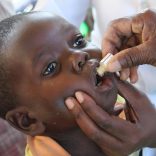Mozambique. Cholera vaccination planned for 1.7M people in five days in Nampula
Mozambique: Initiative to give masks to Maputo traders to be extended to provinces

Photo: Lusa
Graça Tomás, 42, leaves home every day to sell meals at a market in Maputo in order to support her four children, although she has fewer and fewer customers in this abnormal times.
A widow, she insists on going out and seeking living, despite being aware of the increased risks of becoming infected with the new coronavirus that causes Covid-19.
So she is thankful when a group of activists touring the capital’s markets hand her a simple mask to protect her face.
“We feel the need to help women who have to go to the streets to survive,” said Enia Lipanga, one of the leaders of the group, which as yet lacks a name but which has been growing since 7 April. “We thought of a campaign to raise [funds for] masks to offer women in the markets.”
The initiative, set up by three women activists, started with the distribution of just 80 masks a day made out of capulana – a traditional local printed fabric – thanks to small donations from local designers. But as the weeks went by the number of supporters increased, as did those of masks and volunteers.
By last week 13 women were distributing more than 1,000 kits a day, consisting of two masks, soap and a pamphlet with instructions from the Ministry of Health showing how the masks should be used.
The activists received support in the form of 10,000 capulana masks from H2N, a non-governmental organisation working in the field of health communication in communities in Mozambique.
“The initiative was aimed only at women, because they are in greater numbers in the markets, but when we find men, we also give them,” said Chitsungo.
In addition to giving masks to those who don’t have any, the activists distribute them to people who are wearing disposable masks, so replacing those that are not line with the recommendations of health authorities.
Graça Tomás is thankful. She has been cooking and selling meals for more than 25 years at the so-called Mercado do Povo (People’s Market) in the centre of Maputo, and is now full of anxiety every day.
“Being mother and father at the same time makes it more difficult to cover expenses,” she says. “And now that the kids are out of school, all at home, it’s just a mother here, a mother there, and it doesn’t work out.”
She says she used to see more than 50 customers a day at her stall, but since the state of emergency was decreed and people were recommended to stay at home unless they have to go to work or have some other essential task, the number of customers has dropped to fewer than 10. On some days not even one appears.
Many people in Mozambique are using masks made of capulana, because they are cheap. While surgical masks cost 100 meticais (€1.40) each, capulana masks cost half that, but even that is out of the reach to many people, for whom every metical counts in terms of household expenses.
The arrival of the group of 13 women activists at the Mercado do Povo seems to answer some of Graça’s prayers: they relieved her and 100 other vendors of their anxiety.
“It’s a commendable initiative,” she says. “Many of us didn’t have masks; we were selling [our wares just] to buy one.”
Ester Chauque, secretary of Central B neighbourhood, sees the initiative as an example that “should continue and cover all salespeople”, noting that many cannot afford masks.
“It’s not much money, but those who don’t have it really don’t,” she says, adding that this is especially true when traders have fewer customers. “The Mercado do Povo has changed a lot.”
The campaign has already covered four major markets in Maputo during the month of April, with more than 3,000 kits already distributed.
“We don’t want to limit the campaign to Maputo, so we are still studying ways to extend it to the other provinces of the country,” concludes Chitsungo.













Leave a Reply
Be the First to Comment!
You must be logged in to post a comment.
You must be logged in to post a comment.